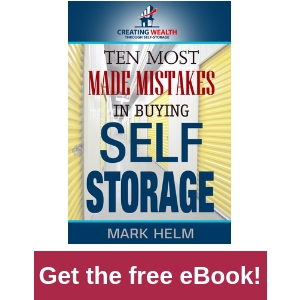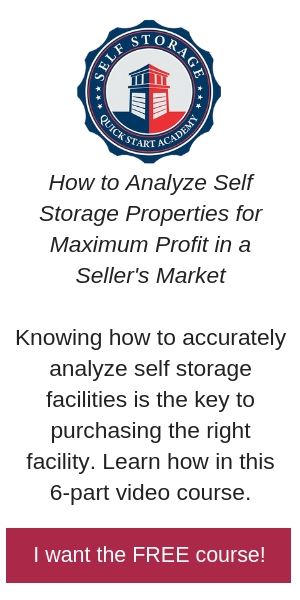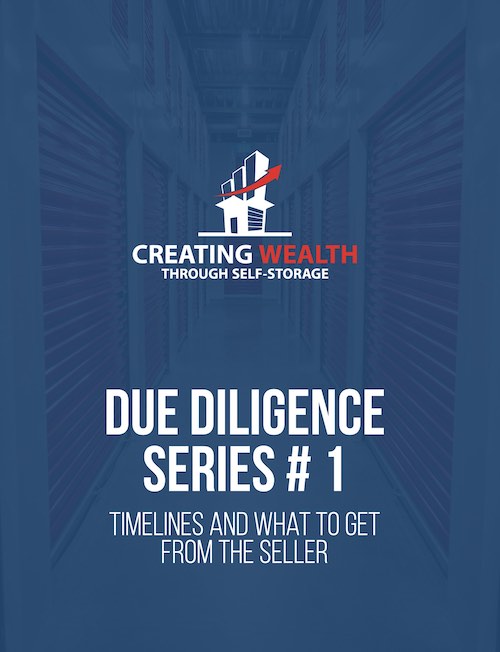This is the final episode in a series on leadership development inside a self storage business.
Remember, no matter where you are in your self-storage journey, owning a portfolio of facilities, or just starting, you will be creating a culture as you get in the business.
You will be creating an experience that customers, vendors, employees, partners, and all team members will have as they interact with you and your company.
It is going to be there. It will emerge either by design or default.
As you can probably guess, I say creating your company culture by design is preferable.
Remember, most small business owners, especially small self storage owners, have a company culture by default. The self storage culture is the unconscious reflection of the owner’s personality.
That is a culture created by default.
Culture
So, when I say company culture, what exactly do I mean?
Let’s define your self storage company culture as:
How you and your team members do what they do in the workplace. It’s the sum of your systems and structure in place and your behaviors and values. These combined create an experience for your employees and customers. At its core, company culture is how things get done and the experience created.
As I stated in the last episode as an example, when we take over facilities previously owned by people who unconsciously micromanage, in other words, tell every employee exactly what to do all the time, it occurs unsafe for that employee ever to do something different.
That culture is not what we try to create.
My experience is those employees tend not to do very well in our company.
Early in my storage career, I remember having just purchased a large facility, and before I had partners who handled operations. I was the one in charge. I purchased this company and had a preliminary meeting with the employees who worked for the previous owner. I told them what we were trying to create as a company and set what I thought were reasonable expectations. I felt they would be happy because they would have the chance to shine and grow as people working in the self storage industry.
I had a weeklong training I attended shortly after that meeting and thought this would be a good chance to let them expand.
Boy, was I wrong.
The place descended into chaos, with everyone fighting trying not to do more than the next person.
The type of employee that functions well under a micromanager owner with a strong personality is usually not the type of employee that will function well within predefined structures and guidelines.
I learned that for our company, we need to hire for desired skills and personality traits and not just assume because someone is working at a storage facility, they will work in our company.
Over time, I have come to believe there are four spaces to address in creating a company culture.
I know this may sound strange, but even if you have not hired your first employee yet, you still have a company culture or are going to create one.
Is it by design or default?
Four Spaces of Creating A Self Storage Company Culture
#1: Decide what Your Company Culture Is
What are you going to create?
I suggest starting with the experience you want your customers to have. Are they going to walk into a high-tech, automated facility with few people?
That is a culture.
How will the space look? How will the signs read? What will the screens look like? With there also be live people available?
How will the people answering the phone speak? Will they match the text and photos on the website?
Or perhaps you are a low price, low touch, value-oriented storage facility. Not better or worse, just different. Customers will have a different experience there.
Perhaps it is my age, but I still like interacting with live people. So, in our facilities, we usually have managers, or at least a live person on a screen in a smaller non-person managed facility.
We spend time training on what questions to ask and how to interact with customers. Here is where we think the empathetic nature of who we are looking for makes a difference. We tend to test (and interview) potential employees, and empathy is one of the trains we look for (again, not the right trait, just one we value).
Another reason we value this trait, besides just a good customer experience, is because if a strong relationship is forged between customer and manager (or person at the facility), if the customer’s ability to pay becomes an issue, usually they will try to pay their storage bill over another bill where there is no relationship present.
But this is our culture. There are days when I wish we had fewer employees. Just as in all of life, there are tradeoffs with everything.
But in my opinion, here is where you start. Begin with the customer experience you want to create and work backward. Work all the way to the type of vendors you want to use to create the experience people will have as they interact with your company.
#2: Seek Input From Employees Or Partners
For some, this may sound weird, but I have found out the hard way if in fact, I am consciously trying to create a culture and have people helping me in the form of partners or employees, getting buy-in for the company I am trying to create is critical.
If all my thoughts on customer experience or the “brand” I am creating are in my head, then I tell people what I want to be done; odds are things won’t go too well.
By the way, I have done this repeatedly in various ways. It usually is masked under the excuse that I have a lot to do, and let me tell you, what I think is the best way to do things.
If there is no buy-in, or my partners and employees have no experience in helping to define or create the company, then rarely, if ever, what happens, in reality, is a match for what I have in my head.
Now I can fire them and hire people who will do what I tell them to do and no more, but that is not what I am trying to create. Nothing wrong with that, just not what I am trying to create.
So, I have learned to take the time to have everyone involved in the front lines (i.e., dealing with customers) or partners who are helping me run and grow the company to help give input in creating the vision of the company and what customers will experience.
Usually, I lead them to something close to my vision. Then as a group, we create the structures and systems necessary to execute what we are collectively seeing.
I have also hired people to lead us through this together. Here are many ways to do this, and I am not an expert at it or want to use this episode to explain the various options.
Just know they are there.
When we take the time to do that collectively, our chances of creating something close to our vision are greatly enhanced. The employees and partners are also vested in the outcome because they helped create it.
This process can sometimes be agonizing and painful for a strong personality like mine, who has very little patience for details. But over time, I have learned the value of “wasting” a day or two to go through this process.
I truly feel this has been a big part of the low employee turnover our company has had.
#3: Hire for Culture First
So, you can see, as we hire people, at least in our company, we tend to hire people who we think will try to fit in.
We have some pre-defined traits we seek, then test and interview trying to match people to the trains we seek.
Right or wrong, we feel any storage-specific knowledge can be taught, so we are not necessarily looking for people with self storage experience.
Even when it comes to hiring, let’s say, maintenance people. We first look for the skills we are seeking, but also for people who can (1) be part of a team and (2) interact well with customers. Even though the customer interactions are not the primary job description, we know they will, so we test to make sure those skills are available.
There are a lot of different kinds of personnel testing methodologies out there. Just research it to see which one you thank will work for you. WE have tried three different ones over the years.
#4: Recognize & Celebrate Employee Achievements
This can also go for vendors.
I used to think employees were motivated by money.
Don’t get me wrong, some are, and money is important to everyone. But I have discovered for most of our managers, what motivates them is (1) feeling they are part of something bigger than themselves and (2) knowing someone knows and acknowledges when they do their job well.
As weird as it may sound, my experience is acknowledgment, and I mean specific acknowledgment for specific things done well mean a lot.
Often more than bonuses.
Not always. But at least for the people we tend to hire, this is the case more often than you think.
The same goes with partners. Especially partners. I am not the best communicator, so often, people can feel like I don’t appreciate them or think they do a good job. In my world, I am just moving fast, going from one task to the next. However, this way of being often comes off as aloof and uncaring.
I have to set up reminders to slow down and connect with people. As Stephen Covey said in the Seven Habits Book, be efficient with a task and effective with people. Being efficient with people the way I often do it doesn’t work well sometimes.
I also get a lot of rigorous coaching at home around various aspects of this issue, especially about connecting with my wife’s rather large extended family.
Conclusion of Leadership Series
The past four episodes have been my attempt at describing the qualities of what I see as a good self storage owner.
Believe me, I wasn’t focused on most of what I had discussed when I got in. I tried to do a deal and then keep my head above water.
Most of what I am talking about in the past four episodes, I have had to adapt to deal with issues not being focused on them created for a growing company.
I sure wish I had had some knowledge to focus on them from the start. Even as a solo operator at first (which is never really the case…there is always a team), or so I thought, if I had put at least some of my attention on these issues, I would surely have done better and grown faster.
Be the Leader a business owner should be and define your niche in this fantastic industry of self storage.
I look forward to connecting with you along the way.



